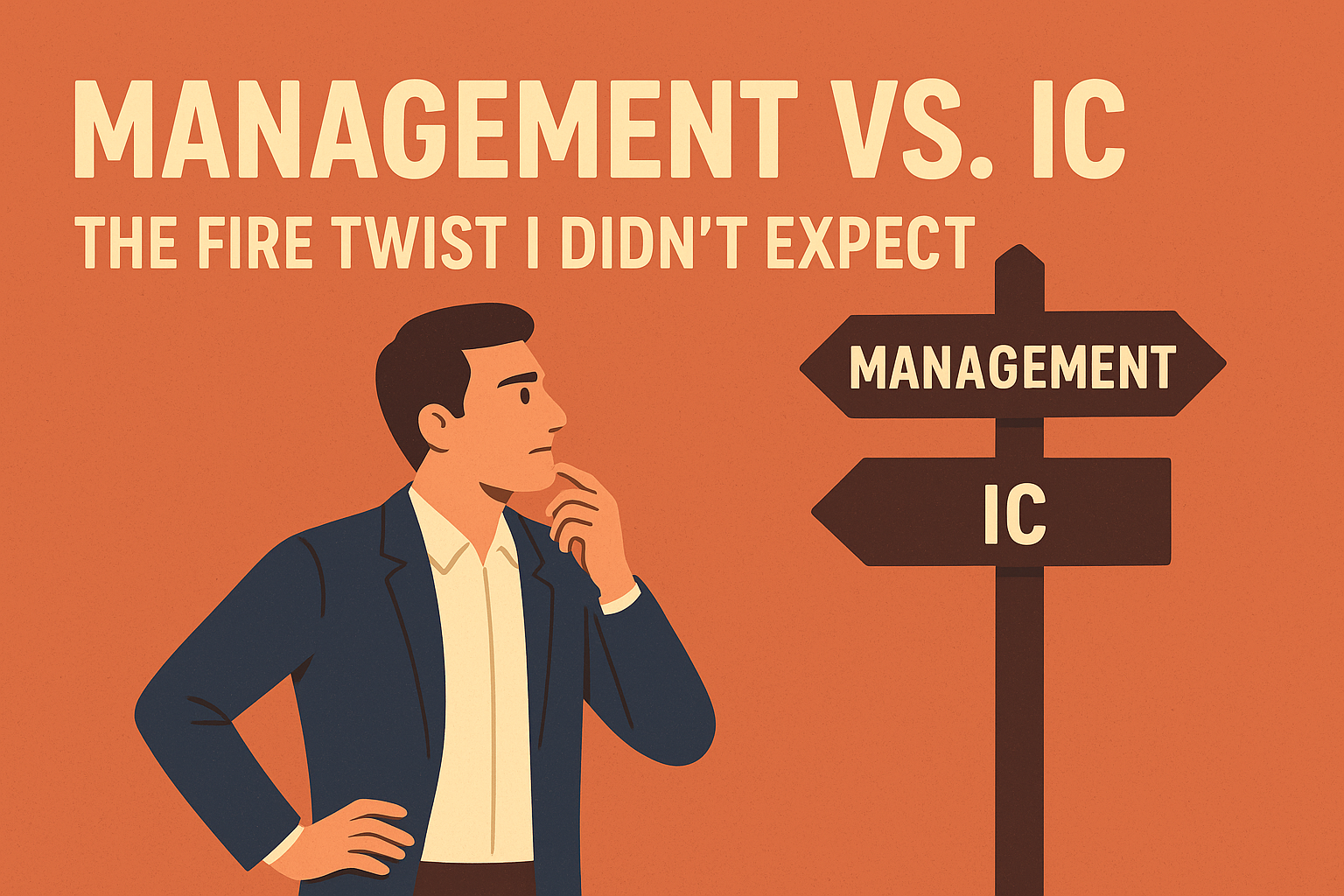5 Tips on how to get promoted in a big company
Over the last 8 years as a manager of engineers and having been in hundreds of conversations about promotion candidates, I have learned that there is a huge disconnect between employee expectations and reality. Specifically, there is a gap in understanding of the employee’s role in the promotion process vs their manager, of the employee’s impact vs how hard they work, and of the employee’s behaviors vs how they are perceived by others. If you are frustrated about your lack of promotion or just want to learn how the sausage is made, this post is for you. Are you ready? Standby.

Tip #1 - You are the CEO of your career
You are the CEO of your career. Your manager, your peers, and your friends at work don’t care about your career. They may help you through a small portion of it, but no one will truly invest the energy that’s needed to continuously guide you. It’s important that you are always in charge and don’t let things happen by chance. Find the great manager to follow, find the great team to build with, find the great mentor(s) to learn from, and constantly reassess that support system to see if you’ve outgrown their value to you. A manager who is good at coaching a new grad might not be the best manager to coach you to become a Principal engineer. Most importantly, do *not* let your career happen by chance. Be intentional with your relationships and your time.
Tip #2 - Know when to stay vs when to leave
One of the most common questions I get when talking to others is “when should I leave my team? My manager is hinting at a promotion in the next 12-18 months.” These are really difficult scenarios because the other piece of the puzzle is missing: what team or company are you leaving to? And does that new environment provide the thing(s) you want? Here’s the short framework that I’ve used to help me decide, but your mileage may vary based on how much faith you have in the new opportunity:
-
Remove pay/promotion from the equation. Based solely on the current team/company, will you have an experience that is so good that will be hard to replace in the near term? If yes, consider staying but make sure you are learning at an accelerated rate throughout that experience.
-
Remove the current team/company from the equation. Based solely on the pay/promotion prospects of a new team/company, what are the chances you can replicate that in your current role? How long would it take? How many things must go right for it to be realized? If it’s anything longer than 6 months, I would consider leaving. Anything further out than that is a random guess.
-
If both questions above suggested that you leave, then it’s a no-brainer, leave. If 1 of them suggested that you leave, continue to look for another team/company. If none of them suggested that you leave, stop thinking about it for 6 months and be heads down to create value in your current role.
Tip #3 - Think and perform at the next level
After hitting a certain level of seniority you may be frustrated on why the next promotion is so hard. And none of your managers can give you a straight answer as to why you aren’t promoted. The truth is, the higher you go up the less of a template there is to get to the next level. But here are some things to keep in mind:
-
Does your manager’s manager know what you’re working on? If yes, hopefully, it’s because what you are working on is of high enough importance. If no, you’re not going to get promoted very high (I am very positive about this).
-
Are you able to routinely (at least quarterly) impact what your manager does? For example, they may seek your opinion on a particular project or high-level direction of the team/org.
-
When your manager goes on vacation or is very busy, are you the default point of contact? If yes, it may mean you possess the baseline leadership abilities to navigate ambiguity of the next level. If your manager is appointing multiple points of contact while they are out, it most likely means no one under their leadership is operating near the next level. I’ll caveat that every role/situation is different, but directionally, it is a good thing to have your manager trust you during these times.
-
And most importantly, do you express strong opinions on the most important topics for your role? This is the basic building block for always having the chance to have a seat at the table.
Tip #4 - Express strong opinions on the most important topics
It’s fair to say that if you do not have strong opinions on the most important topics, you aren’t ready to take your career to the next level. This is the baseline trait of those who progress. And if you’re saying to yourself “most important” is different for different people/roles/time of year/etc then you are exactly right! As a rule of thumb, to know which topics are most important to you, you must first know what is important to your manager, your manager’s manager, and your team, in that order. The hard part about all of this is that you are most likely not invited to all of the meetings or shared the information to be able to formulate good opinions. The best way I’ve found to get a seat at the table is to show competence at everything you’re a part of, make sure you’re noticed, and be able to speak intelligently on topics you know little about with what little time you’re given to talk. The next level of this tip is that you have developed a vision of your team/org’s future that influences at least your manager’s manager’s plans. This is rare, but something to strive for if you feel unsatisfied in your current role, and a great way to turbocharge your career.
Tip #5 - Respect everyone
As you climb the ladder, leave your old teams behind, and engage in passionate arguments with your manager/partners/teammates, it’s really important to always treat everyone with respect. Not creating enemies with people at work and not having a reputation of being hard to work with is imperative to be successful at the higher levels. You certainly won’t get promoted for being the most likable person in the company, but you will definitely be held back from promotion if multiple people find you hard to work with. I’ve mentored some absolute rockstars who just didn’t care about others and we’ve had to hold their promotions for another 6-12 months. Do not let this get in the way of your promising career!
Conclusion
If you’ve read this far, let me know in the comments or in private if this type of content is useful to you. I am considering helping others, especially those in the tech field, navigate their careers via career coaching sessions.
Featured
[

](/blog/the-post-financial-independence-life-no-one-talks-about)
The Post-Financial Independence Life No One Talks About
[

](/blog/im-building-a-fire-tool-and-i-need-your-input)
I’m Building a FIRE Tool — and I Need Your Input
[

](/blog/management-vs-ic-the-fire-twist-i-didnt-expect)
Management vs IC: The FIRE Twist I Didn’t Expect
Enjoyed this post?
Subscribe to get my latest posts on financial independence, investing, and the journey to FIRE delivered straight to your inbox.
More Posts

Trump Accounts: Free Money for Your Kids (And How to Maximize It)

5 Things I'm Focused On In 2026

Comments